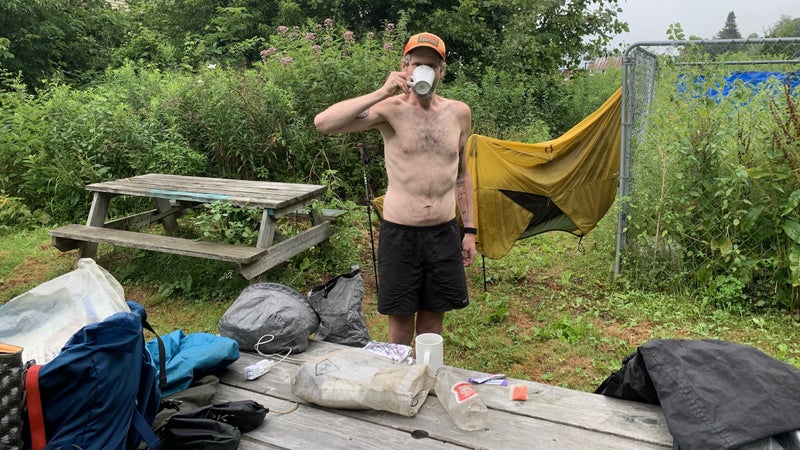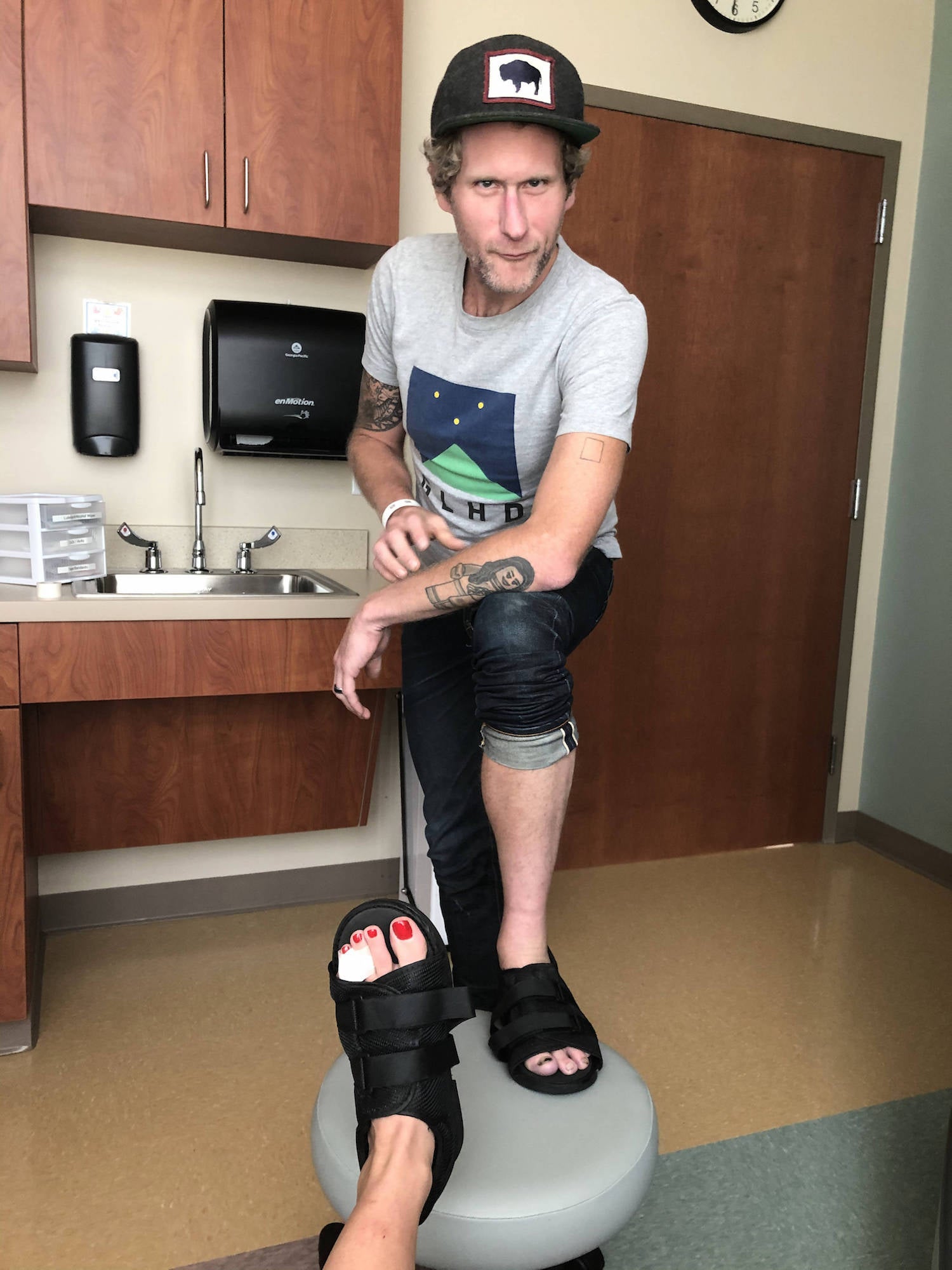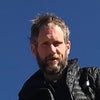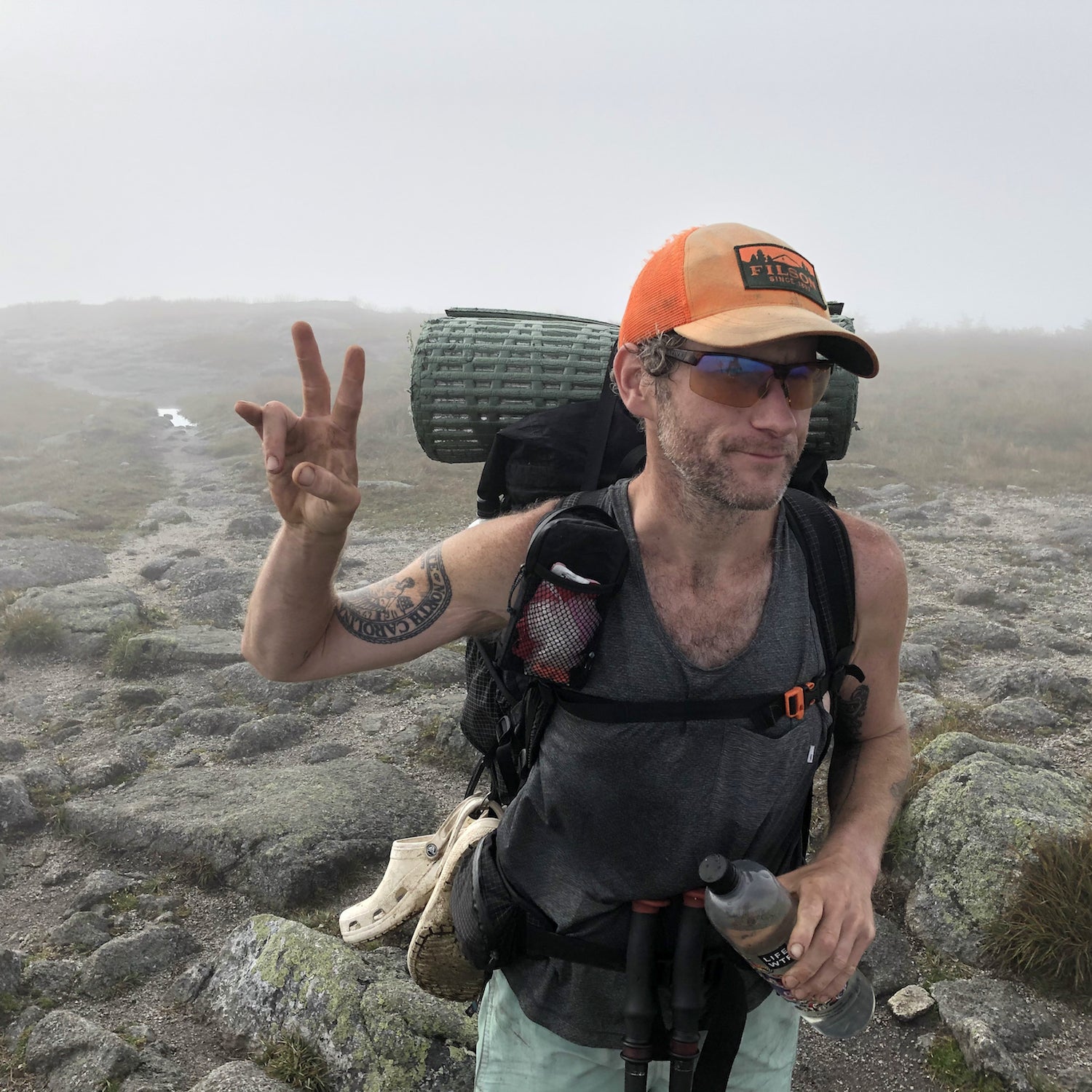You should have seen my legs the night I finished the Appalachian Trail. Standing naked in front of a half-length mirror in a Maine hotel room so dingy and dated it should have come with complimentary mothballs, I marveled at what I had become over��the past 2,200 miles. I was now a rippling sheet of endlessly lean muscle, my sinew bulging beneath��mud-caked skin like some surrealist relief map of the ancient ridges I’d walked. David might have looked this ripped, I mused to myself euphorically, had Michelangelo wielded a better chisel.
There was, however, a twinge of irritation. Although my wife, Tina, and I had transformed our bodies into aerobic-exercise automatons over the past five months, becoming more fit than we’d ever been, we’d have to wait to run—she’d broken a toe during a day off, with 600 miles to go, while I had broken one three days before the summit of Mount Katahdin and the end of the AT, when a root in the 100 Mile Wilderness ripped through my trail-tattered shoe. Our brief stints in medical boots would provide a chance to rest and recover. It was only late August of 2019; I assumed we’d be ready for marathon medals and astounding PRs by the winter season.
I’ve never been more wrong: the 17 months since we scrambled down the junkyard-like�� of Katahdin’s south side on broken toes and in obliterated shoes have been a seesaw between enthusiastic exercise and a forlorn state of inactivity, connected��by varying levels of chronic pain and, consequently, depression. I have not raced at all. Instead��I have become a willing ward of the health care system, trying to figure out why, exactly, my parts don’t work or recover like they did before we sprang north from Springer Mountain, Georgia. Nearly two years after I set off on��the Appalachian Trail, I finally have part of the answer—and, I hope, a solution.
I’ve frequently wondered—during restless nights and uncomfortable days, when sitting, standing, and sleeping hurt—if I ruined my body forever by using it too hard thru-hiking. I don’t think so, but I’ve climbed a mountain of exercise, anxiety, depression, and doctors��appointments to reach that tentative opinion. What’s more, when I started asking fellow hikers if they’d suffered from intractable and unexplained pains, or the new sense that any exercise still hurt days later, a shocking percentage said yes. They told me about lingering stress fractures and pulverized joints, obdurate ligaments and gnarled digits. We talk a lot about��post-trail depression; one reason for it, often unspoken thanks to stubborn pride in our personal choice to suffer, is that we still fucking hurt.
“The fittest a thru-hiker has ever been or will ever be is when they’re thru-hiking,” says��, a physical therapist, hiking trainer, and trail runner in Missoula, Montana. “I’ve met so many thru-hikers who think that fitness will translate to other sports when they’re done. But it doesn’t. You see thru-hikers jump into a marathon a week after they’re done, and it goes miserably.”

I get that misery. In October 2019, five weeks after finishing the AT, a doctor rechecked an X-ray of my left foot and cleared me for a gradual return to running. Just before I turned 30, this��strange new hobby had potentially saved my life,��pulling me from the diehard lifestyle of a fast-food-gobbling work addict whose weight was spiraling upward and whose self-care routine consisted of strong��morning coffee and stronger late-night beer.
But now, nearly a decade later and with each post-trail stride, a construction crew seemed to be pounding roofing nails into my knees—specifically, the tibial plateau, that typically pastoral flatland beside your kneecap. There��was another month of rest, a battery of stretches and strength exercises, and then another return to running five weeks later.
The second restart felt great for a month, maybe, or right until the cursed new year of 2020 began. It seemed as if my right ankle were about to crack, like Pangaea, into irreconcilable bits. My munificent physical therapist,��, felt so bad about my predicament that she didn’t even bill me for the appointment��and prescribed a slew of��suggestions:��more stretching, more exercises, a set of ankle X-rays, new shoes, expensive orthotics, and a winter of light hikes in the western North Carolina woods.
Summer, when it finally arrived, felt spectacular. Beginning in mid-May, I strode��on a gravel road that unfurls along the French Broad, one of the , basking in a bath of my own sweat but mindful of the black bears that prowl its banks. I hit seven miles at a sub-seven-minute pace. I was back, nearly a year after��I’d finished the AT.
Without warning, as summer gave way to autumn, my lower back began aching, as though loaded with molten lava. My hip flexors were so tight and tired that they’d sometimes quiver when I stood. If I ran just three miles in the evening, my thighs, come sunrise, would feel as obliterated as they did after my first marathon. Perplexed and frowning, my physical therapist prodded me with dry needles near terrifyingly tender places, added yet more exercises, and declared it was time to level up—to a new primary-care doctor who also specialized in osteopathy. We needed to make sure my skeleton, blood, and brain weren’t at fault.
The months since have been a slow-motion episode of House, full of diagnostic tools and cascading tests and educated guesses. (I am fortunate to have health insurance, which should be a natural national right; still, there have been sizable costs insurance hasn’t covered.) I’ve had my blood drawn and scanned for Lyme disease, autoimmune disorders, and cancer. I’ve had ultrasounds looking for unexplained swelling, and hip X-rays searching for signs of avascular necrosis—you know, outright pelvic bone death. I’ve been twisted like an oversize��pretzel by my jocular osteopath,��, and taught how to pop my pubic symphysis into place, a trick I can’t wait to try someday at a dinner party.
I’ve been prescribed antidepressants for nerve pain, and I mostly remember to take them. I have tried CBD salves and THC spliffs, no beer and way too much of it. I have switched shoes twice and used a��Hypervolt foam roller��until I felt seasick. I’ve gotten��so many Facebook ads about the ailments of aging that I hope Mark Zuckerberg considers me when he needs a gerontologist.��

At last, on a Thursday afternoon late last��fall, the doctor sighed, frowned, and announced in an exaggerated deadpan: “You have dead butt syndrome.” The bad news seems to be that my hips, back, and hamstrings compensate for the weight��my ass should be handling. The worse��news might be that my friends think “dead butt” is a riotous nickname for this condition, medically referred to as��gluteal amnesia.
But the good news? That��doctor seems to be right, and something is working. Maybe it’s the shoes, maybe it’s the spine snapping, or maybe it’s the tiny capsules I pop, stuffed with unknowable alchemy. Perhaps it’s the litany of prescribed butt exercises that should land me an ExOfficio��modeling contract any day now.
Or maybe it’s just time. My walk, after all, is naturally bowlegged, so that my feet point out as my knees draw near. (Never take me skiing.) For 2,200 miles, with 20 pounds or so strapped to my back, I reinforced the muscles that had always made me bowlegged, my feet aimed toward ten��and two��from Georgia to Maine. Yet��I run remarkably straight, moving more efficiently than I ever imagined possible with my clumsy body.
My frame is—slowly, steadily—coming back in line with my running habit and life at large. I linger in bed less these days, for fear of finding out what hurts when my feet hit the floor. Everything I’ve already mentioned still aches after I run, but in a way that reminds me I’m on the other side of 35 and that, by this point, I’ve “,” to paraphrase sage fellow traveler Richard Buckner. I’m hoping��the feeling lasts.
All this may sound alarmist, a caveat emptor of preemptive self-pity for the prospective thru-hiker. It’s not. The Appalachian Trail remains the happiest and hardest span of my life, and, at least since finishing, I’ve never regretted the decision. I’ve already completed my 2021 Pacific Crest Trail application () and settled on a tentative start date. Whenever anyone expresses interest in distance hiking, I worry that my effusive enthusiasm will actually deter them.
Instead,��hold on to the patience you foster while putting one foot in front of the other for six months, since you might need it as you recover from putting your body and brain through both heaven and hell at once. We change so much about our lives to prepare for extended adventures, whether selling a house or spending a year in a weight room; it’s absurd to think it doesn’t permanently change us in the process, too. If you’re not hiking or mountaineering or trekking at least in part to learn something about what you can become, why not strap on a VR headset and just stay home? It’s safe there.
On the other hand, you might not need that patience. To wit, one of the five people in my trail family—a 59-year-old rocket scientist who lives on the Space Coast and who we call Robin Hood—had barely run in two decades before he got on the trail. Toward the end of the AT, we talked about racing the Disney marathon together in January. He finished. I was at home, probably moaning about my knees but texting him post-race plaudits.
Half a decade ago, Sara, the physical therapist in Montana, and her now husband, Forrest, hiked the Continental Divide Trail. Together��they exemplify the unpredictability of distance hiking and, really, of endurance athletics at large. When Sara started the trail, she could barely run ten minutes at a time, due��to a hamstring injury. But the repeated stress tests of the trail fixed her. She finished the CDT stronger than she started. While traversing a snowfield, though, Forrest twisted his knee. More than five years later, the pain persists for the��.
“It’s something he has to be really on top of managing now,” Sara says. “It’s not like he can just run and do whatever he wants and get away with it as much as he used to.”
When she says that, I think back to the way I looked in that mirror. I try to be grateful that I had the luxury and luck to stand there at all.


